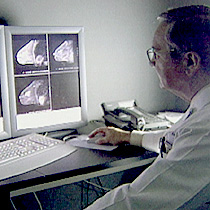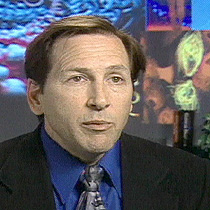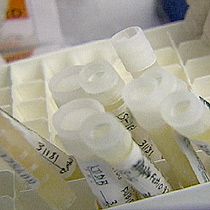2007年VOA标准英语-New Study Recommends All Women Under 50 with Br
时间:2019-01-13 作者:英语课 分类:2007年VOA标准英语(六月)
By Carol Pearson
Washington, D.C.
22 June 2007
Studies show that women with a strong family history of breast cancer -- meaning their mothers, sisters, aunts or grandmothers had the disease -- have a higher risk of getting breast cancer, too. But a new study shows any woman who gets the disease before she turns 50 could also have a high risk of getting cancer in her other breast or in her ovaries, even if there is no family history of these diseases. VOA's Carol Pearson explains.

Nearly 14 percent of breast cancer patients without a family history of breast cancer tested positive for the mutated gene
When breast cancer seems to run in a family, it is possible the disease is passed along by a mutated gene.
But a new study published in the Journal of the American Medical Association shows family history does not always tell the whole story.
Dr. Jeffrey Weitzel and his colleagues at the City of Hope Cancer Center in California, studied more than 1500 breast cancer patients. Most got breast cancer before they turned 50.
The study showed nearly 14 percent of breast cancer patients without a family history of this disease tested positive for the mutated gene.

Dr. Jeffrey Weitzel
Dr. Weitzel says the greatest finding is that fathers, as well as mothers, can pass this mutated gene to their daughters.
"What we showed was that if you had a limited family structure, not enough women in the family to help see the trait, that you were three times more likely to be a carrier," says Weitzel.
Women with this mutated gene have a 50 to 85 percent chance of developing breast cancer over their lifetimes compared to a ten percent chance for those without the mutation 2. They are also at higher risk for developing ovarian cancer. Their doctors often recommend genetic 3 testing, and if the test is positive, they offer more thorough cancer screening.

Genetic testing may become more common
But genetic testing is usually offered only to women with a strong family history of breast cancer. Dr. Weitzel recommends offering genetic testing to all women who develop breast cancer early in life.
"We want to be sure and offer testing to women who had early onset 4 breast cancer, despite the lack of a family history," adds Weitzel.
Michele Rakoff survived breast cancer. She does not have the gene, but she speaks out for those who have the disease. "We need to make sure that women are aware that you can get a genetic mutation through the line of your father as well as your mother," says Rakoff.
Dr. Weitzel agrees. He says if a woman is diagnosed with breast cancer early in life, genetic testing could help save her life.
- A single gene may have many effects.单一基因可能具有很多种效应。
- The targeting of gene therapy has been paid close attention.其中基因治疗的靶向性是值得密切关注的问题之一。
- People who have this mutation need less sleep than others.有这种突变的人需要的睡眠比其他人少。
- So far the discussion has centered entirely around mutation in the strict sense.到目前为止,严格来讲,讨论完全集中于围绕突变问题上。
- It's very difficult to treat genetic diseases.遗传性疾病治疗起来很困难。
- Each daughter cell can receive a full complement of the genetic information.每个子细胞可以收到遗传信息的一个完全补偿物。